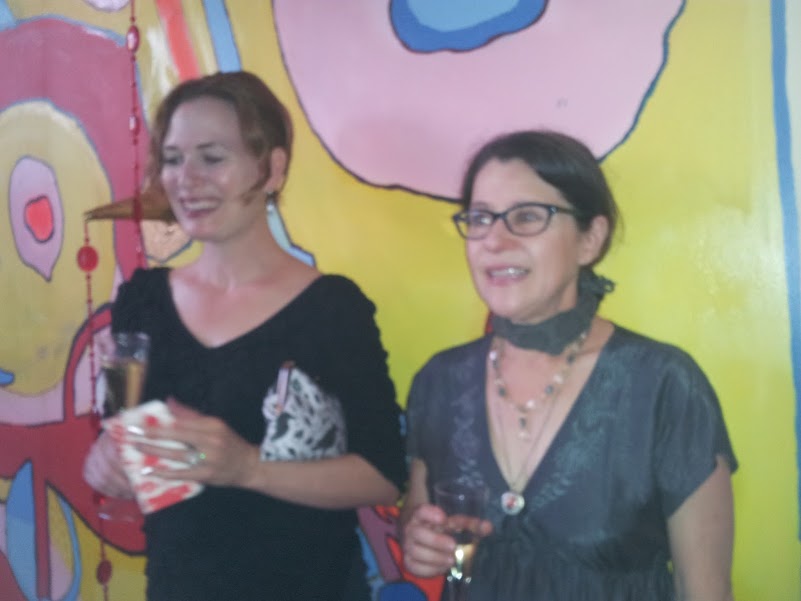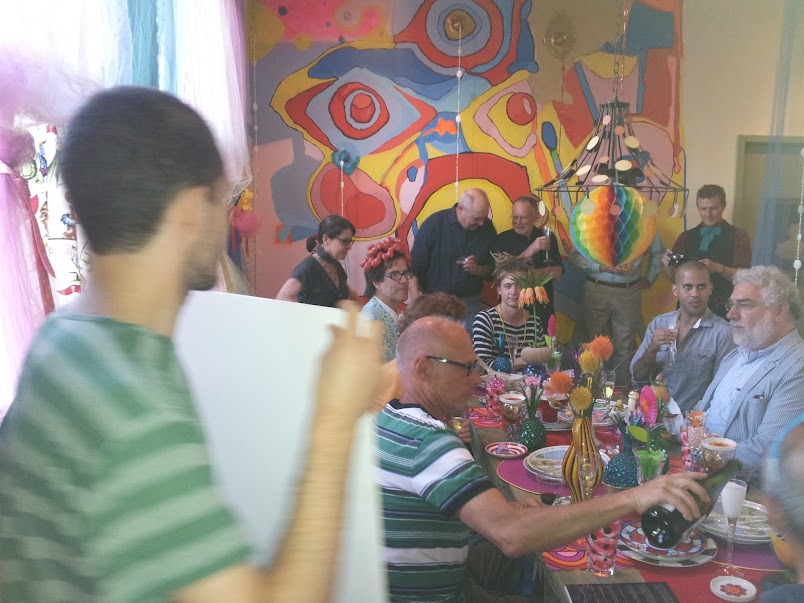Art Counsel
Collections information specialistsArchive for June, 2012
Conceptual Space in Milwaukee
For a last hurrah before remodeling as a more open, streamlined space, the Portrait Society Gallery hosted “A Fop’s Banquet, an Exhibition in Three Acts” last night. For those of you unfamiliar, the gallery is dedicated to exploring the concept and function of portraiture in art – a generally underconsidered genre.
Most worth mentioning is the whimsical “banquet room” where guests were invited to participate as part of the exhibition and in a cleverly organized auction, as well as to observe. A professional photographer took portraits and snapshots throughout the evening in all of the gallery rooms so it will be interesting to see if they translate into a new “hall of mirrors” sort of portraiture exhibition.

Kat Murrell and Debra Brehmer
Owner, Debra Bremer has long been working in a participatory curatorial style (the most notable being the Winter Chapel exhibition) that promises to flower into something increasingly more conceptual with the new layout. I am looking forward to making the trip from Chicago to attend its future functions and Ms. Bremer’s curatorial explorations

“A Fop’s Banquet” auction
.
Musings about the MicroMuseums that are Relational Art (repost)
Since beginning exploration of relational aesthetics, my opinions have been troubled. The difficulty has not been with how to stick it in a box and label it – I am refreshed by the many absurdities that are revealed in the attempt to do so. However, the relational event is curiously indefinite regarding its place in the realm of art production. As a trained curator and archivist, to me many relational events seem like curatorships, and their artifacts, like collections. There is also a scientific strain that while refreshing, often slides quite closely to sociopathic puppeteering. That is not to say that string-pulling is anathema to art, but the strings are palpable, almost visible; and they tend to make the participant rather pathetic.
To explain the sense of pathetique, the development of the happening over time needs to be addressed. The more utopian, earlier attempts such as Beuys’ Bureau for Direct Democracy and even Graciela Carnevale’s Experimental Art Cycle with its goal of violence promised a certain inclusivity and universality, yet remain firmly in control of the artist. The audience is part of the show but voluntarily so; therefore retaining a certain level of dignity regardless of their reaction to the staged relational act. Adrian Piper’s later Notes on Funk still retained a hope for the universal experience, but did not bet on it, as it hinged on post-modern historical revisionist strategy intended to educate on some level. Tiravanija’s Pad Thai, however, was not led nor attended by the artist, and was entirely participant led. Predictably, mostly art scenesters attended. This in itself is perhaps an interesting framing of that momentary state of art and society, and there is no sense that this result was intended, but the outcome was, considering its set-up and marketing, fairly likely. Therefore, while the space between the audience and the author has up to this point been closing, this exhibition marks the distancing of the author from a work which consists of audience – and the artist relinquishes a certain amount of personal responsibility for a human situation that s/he created.
This may appear in some ways to be anti-creative, but it is on the contrary an invitation to Chaos that rather flatly gives way to Predictability. Neither force lacks creative potential, but it does expose that Potential is what drives relational concept-building. Further, relational aesthetics is simply a different philosophy/creativity that allows the non-artist to create consciously or not within a constructed social frame, yet creative potential is limited because the vast majority of people (Western tradition anyway) have a century-old rather polite perception of what art is and should be, so the sense of play can be seen as a game of manipulation rather than an opportunity to step into an authored, limited and temporary “culture” that foregrounds the frames we unconsciously construct for ourselves.
REFERENCES
Participation. Ed. Claire Bishop. London: The MIT Press, 2006. Print.

